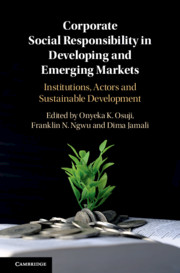 Corporate Social Responsibility in Developing and Emerging Markets
Corporate Social Responsibility in Developing and Emerging Markets from Part III - Normative and Utility Perspectives
Published online by Cambridge University Press: 18 December 2019
The chapter shows that one way of tackling the problem of weak regulatory systems that allow corporations to ignore environmental sustainability in their business activities is to make corporate investments in environmental sustainability in developing countries economically attractive to the corporations. And in the process enable them to contribute to the achievement of the Sustainable Development Goals in these developing countries, while reaping economic rewards for doing so. ‘Green capitalism’ as a concept merges economic capitalism with green objectives and when appropriately utilised, can be an effective tool for achieving the SDGs in developing countries. This chapter analyses the application of green capitalism in developing countries and how it merges the profit-focus of capitalism with environmental sustainability. Utilising the ‘environment contestation approach’, the chapter examines how ‘green capitalism’ reconciles the notions of free-market enterprise and the sustainable development desired by developing countries. It discusses the regulatory steps needed to prevent potential ‘greenwashing’ by corporations while incentivising increased investments in SDGs-related projects within these jurisdictions. Using available statistics, the chapter examines the success of ‘green bonds’ issuance for environmental projects as a reflection of the increasing reliance on green capitalist tools for achieving the SDGs in developing countries.
To save this book to your Kindle, first ensure no-reply@cambridge.org is added to your Approved Personal Document E-mail List under your Personal Document Settings on the Manage Your Content and Devices page of your Amazon account. Then enter the ‘name’ part of your Kindle email address below. Find out more about saving to your Kindle.
Note you can select to save to either the @free.kindle.com or @kindle.com variations. ‘@free.kindle.com’ emails are free but can only be saved to your device when it is connected to wi-fi. ‘@kindle.com’ emails can be delivered even when you are not connected to wi-fi, but note that service fees apply.
Find out more about the Kindle Personal Document Service.
To save content items to your account, please confirm that you agree to abide by our usage policies. If this is the first time you use this feature, you will be asked to authorise Cambridge Core to connect with your account. Find out more about saving content to Dropbox.
To save content items to your account, please confirm that you agree to abide by our usage policies. If this is the first time you use this feature, you will be asked to authorise Cambridge Core to connect with your account. Find out more about saving content to Google Drive.